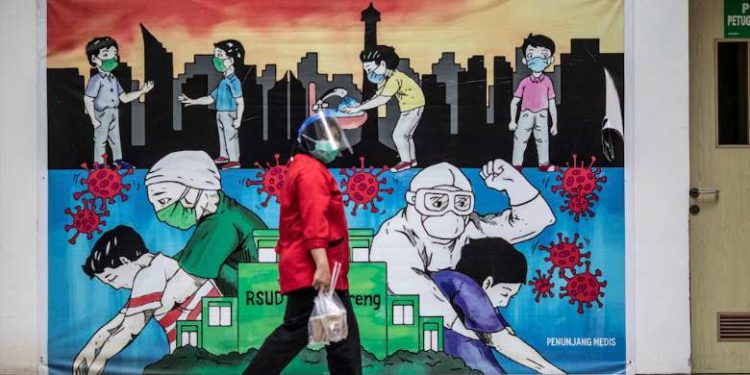A dramatic spike in new coronavirus cases could force Indonesia back to ground zero. Many hospitals are running out of beds and health equipment supplies are depleting.
The increase began a week after Eid al-Fitr but went out of control in the last two weeks, with cumulative cases passing 2 million. The surge is terrifying as it took 11 months for a million cases to be recorded but only five months for the number to double.
Since Indonesia’s first Covid-19 case in March last year, the highest daily figure occurred on June 24 with 20,574 positive cases from 138,896 tests. Experts believe the figure would be higher if more tests were conducted. Nearly half of the new cases were in Jakarta and cities in Java.
The ascending curve ended months of lower infections, with only 2,385 cases being recorded on one day in mid-May. It was delusional, though, and people were too quick to assume it was the last chapter of the pandemic. That led to carelessness.
Health Minister Budi Gunadi Sadikin admitted that massive Eid activities caused the spike, exacerbated by the rapid spread of the Delta variant, which appears to more contagious than other variants.
The Delta variant was originally discovered in India and has infected citizens in 80 countries. Cases of the variant were found in nine Indonesian provinces as authorities warned it was increasingly infecting young people including children.
The occupancy rate of Covid-19 referral hospitals in Jakarta, West, Central and East Java provinces has passed 90 percent
The health department said that Indonesia’s positivity rate has reached 23 percent, far above the World Health Organization safe standard of 5 percent, which raises concerns over hospital capacity.
Government data showed that the hospital occupancy rate was approaching the limits, particularly in Java, which is home to 151 million people or 56 percent of the Indonesian population. The occupancy rate of Covid-19 referral hospitals in Jakarta, West, Central and East Java provinces has passed 90 percent.
Indonesia’s largest Covid-19 treatment facility, Wisma Atlet Hospital in Jakarta that has 7,394 beds, is running out of beds and denying admissions of new patients. Some hospitals in Java’s cities have erected tents for use as emergency rooms, while others accept only patients with serious symptoms.
Some media reports said several important hospitals could be dysfunctional as the government has yet to pay off debts totaling 1 trillion rupiahs (US$70 million) that it spent on fighting the pandemic.
The Indonesian Doctors Association warned that the worst has yet to come. High occupancy levels in referral hospitals showed that the pandemic could be more devastating than ever. When hospitals reach their limit, many Covid-19 patients would be unattended and left to die without treatment.
Doctors called on the government to set aside other issues and give priority to hospitals, providing more beds, recruiting new health workers and supplying more protective gear, laboratories and medicinal supplies for the next six months. Incentives for health workers must not be delayed.
The government has been urged to impose a lockdown in Jakarta and other cities. However, in the meantime, the government does not seem to agree with a total lockdown.
Instead, President Joko Widodo has instructed ministries, governors and district heads to only restrict people’s activities and mobility, particularly in red zone areas.
The policy includes a prohibition of gatherings of more than three people and curfews in some areas. Offices, food stalls, restaurants, cafes and commercial centers may continue to operate but are limited to 25 percent of capacity.
While such a policy has the noble purpose to prevent the further spread of the virus, experts have warned that its impact on the economy, which has shown positive signs lately, will be severe.
Finance Minister Sri Muliyani Indrawati said such a policy may hurt projected economic growth during the second quarter of this year, but the government doesn’t have many options.
Experts have suggested that the government inject more stimulus funds to help families and industries affected by the pandemic. Last year the government allocated nearly 700 trillion rupiahs or $50 billion. They said the government should add another 300 trillion rupiahs or $21 billion.
Indonesian Christians have responded positively to the government’s call to once again suspend church activities
The government has instructed religious leaders through the Ministry of Religion to limit religious activities. Houses of worship in many areas have been ordered to suspend activities.
Indonesian Christians have responded positively to the government’s call to once again suspend church activities.
Church leaders have taken necessary steps and encouraged Christians to be pioneers and role models in supporting the government’s efforts to stem the growth of the virus.
The Union of Churches in Indonesia has called on its members to refrain from conducting fellowship and services in churches. Instead, churches should develop creative ways to reach out to the faithful.
Similarly, several dioceses including Jakarta Archdiocese have instructed parishes to suspend Masses and return to online services.
The growth of Covid-19 in Indonesia remains unpredictable and it may take a long time to come out of such misery as the number of people being inoculated remains low. As of now, only 7 percent of Indonesians are fully vaccinated and about 13 percent have received their first inoculation.
Vaccination remains the only option to end the pandemic. The government must increase the number of daily inoculations to 2-3 million if it is to achieve herd immunity by the end of the year.
The views expressed in this article are those of the author and do not necessarily reflect the official editorial position of UCA News.
Credit: Source link




